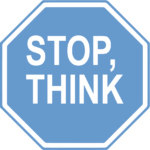Module 5: Psychological Theories of Addiction
Ch. 4: Implications of Cognition and Learning Theories for Intervention
This chapter demonstrates something we discussed back in Module 1: the ways that theory can inform practice. The authors of the piece that you are reading here discuss an intervention approach with a considerable degree of evidence supporting its use in addressing substance use disorders—cognitive behavioral therapy (CBT). CBT is a type of behavioral intervention based on the assumption that substance use is a learned behavior and that learned behaviors are changeable through learning. CBT might help a person anticipate and avoid events that could trigger an overwhelming desire for using drugs again (cravings) and introduces new skills for managing these challenging situations. CBT is a carefully constructed intervention strategy that helps people learn to think differently about their problems and situations, and to arm themselves with new tools and skills for changing how they behave in response to situations that previously might have ended up in drug use (Barry & Petry, 2009). The assigned reading here is Granillo, M.T., Perron, B.E., Jarman, C., & Gutowski, S.M. (2013). Cognitive behavioral therapy with substance use disorders: Theory, evidence, and practice. In M.G. Vaughn & B.E. Perron, (Eds.), Social work practice in the addictions, pp. 101-110 (out of 110-117). NY: Springer. Feel free to read the entire piece if you like; but only pages 101-110 are required reading.
In this chapter you will read about:
- Behavioral theory and the underlying learning principles of classical and operant conditioning;
- Cognitive theory and common cognitive errors/distortions;
- Social cognitive theory;
- How CBT integrates these theories and works in combination with other intervention strategies.

Click here for a link to our Carmen course where you can locate the assigned pdf file(s) for this chapter. You will need to be logged into our Carmen course, select Module 5, and proceed to the Coursework area. Under the Readings heading you will find a box with links to the readings for relevant coursebook chapters. Don’t forget to return here in your coursebook to complete the remaining chapters and interactive activities.
 How do the principles and practices in CBT (cognitive behavioral therapy) for a substance use disorder relate to the various psychological theories we have studied in this module? This includes the learning theories, social learning theory, information processing, and the others.
How do the principles and practices in CBT (cognitive behavioral therapy) for a substance use disorder relate to the various psychological theories we have studied in this module? This includes the learning theories, social learning theory, information processing, and the others.
